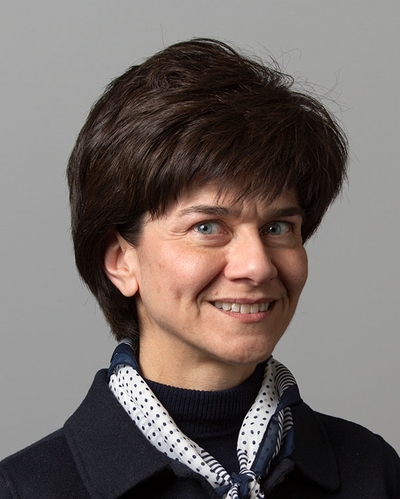
Maria T. Landi, M.D., Ph.D.
Senior Investigator
Integrative Tumor Epidemiology Branch
NCI/DCEG
Research Topics
Dr. Maria Teresa Landi's research focuses on understanding tumor etiology and evolution for potential translational applications. She leads large-scale multidisciplinary research projects primarily on genetic and environmental determinants of lung cancer and melanoma. Dr. Landi pioneers cutting-edge analyses of genomic, transcriptomic, and epigenomic data, and integrates molecular data with histological and radiological imaging and clinical and epidemiological data.
Lung Cancer Studies
Lung cancer is among the most common types of cancer and is a leading cause of cancer death worldwide. Although the majority of lung cancer cases are attributable to tobacco smoking, lung cancer in never-smokers (LCINS) accounts for 10-25% of all lung cancer cases. Most LCINS cases have no known risk factors. In Sherlock-Lung, a comprehensive epidemiologic study of LCINS, Dr. Landi aims to characterize the genomic, epigenomic, and transcriptomic landscape of LCINS and to identify exogenous and endogenous processes involved in lung tumorigenesis. The molecular data are integrated with histological and radiological imaging to develop a more refined classification of LCINS and to identify subtypes that may be associated with distinct risk and prognostic features.
Dr. Landi also leads a study designed to investigate the genetic and environmental determinants of lung cancer in smokers. This study uses an integrative approach, investigating the process that begins with smoking initiation and persistence, continues with lung cancer development, and ends with progression to disseminated disease or response to therapy and survival.
Melanoma Studies
While cutaneous melanoma is the most lethal form of skin cancer, it is both preventable and highly treatable if discovered early. Dr. Landi conducts a series of studies in the general population and among high-risk families to identify common and rare germline genetic variants, environmental exposures, and host factors in relation to melanoma risk and progression. Her work contributes to melanoma risk stratification and better molecular classification of melanoma. She leads the MelaNostrum Consortium, a collaboration between the NCI and melanoma researchers and clinicians from Mediterranean countries, whose populations are typically under-represented in melanoma research.
Dr. Landi and collaborators conducted a meta-analysis genome-wide association study and identified 85 genomic loci associated with cutaneous melanoma.
Other Studies
Renal cell carcinoma incidence has been increasing worldwide and is highest in Western countries. The vast majority of these tumors are clear-cell renal cell carcinomas, which have been studied extensively. Dr. Landi investigates rarer histological subtypes to characterize their clinical and molecular features with possible translational implications.
Dr. Landi additionally examines the role of dioxins in cancer risk among highly exposed populations, utilizing markers of exposure and early effect.
Biography
Dr. Landi received an M.D. summa cum laude from the University of Milan, Italy, and was trained in oncology and general medicine at the San Raffaele Hospital, University of Milan. She received a Ph.D. in occupational medicine and industrial hygiene, subgroup of molecular epidemiology, from an Italian University Consortium in 1993, and qualified for the associate professorship in occupational medicine and industrial hygiene in the Italian Universities in 1998. Dr. Landi received tenure in the Division of Cancer Epidemiology and Genetics (DCEG), NCI in 2006. She is an Associate Professor of Epidemiology at the Johns Hopkins Bloomberg School of Public Health, Baltimore, Maryland. Dr. Landi has assembled a team of investigators, including intramural and extramural scientists, to conduct complex germline and somatic genomic analyses in population studies. In 2021, she was appointed Senior Advisor for Genomic Epidemiology in DCEG's Trans-Divisional Research Program.
Selected Publications
- Shi J, Chatterjee N, Rotunno M, Wang Y, Pesatori AC, Consonni D, Li P, Wheeler W, Broderick P, Henrion M, Eisen T, Wang Z, Chen W, Dong Q, Albanes D, Thun M, Spitz MR, Bertazzi PA, Caporaso NE, Chanock SJ, Amos CI, Houlston RS, Landi MT. Inherited variation at chromosome 12p13.33, including RAD52, influences the risk of squamous cell lung carcinoma. Cancer Discov. 2012;2(2):131-9.
- Shi J, Yang XR, Ballew B, Rotunno M, Calista D, Fargnoli MC, Ghiorzo P, Bressac-de Paillerets B, Nagore E, Avril MF, Caporaso NE, McMaster ML, Cullen M, Wang Z, Zhang X, NCI DCEG Cancer Sequencing Working Group., NCI DCEG Cancer Genomics Research Laboratory., French Familial Melanoma Study Group., Bruno W, Pastorino L, Queirolo P, Banuls-Roca J, Garcia-Casado Z, Vaysse A, Mohamdi H, Riazalhosseini Y, Foglio M, Jouenne F, Hua X, Hyland PL, Yin J, Vallabhaneni H, Chai W, Minghetti P, Pellegrini C, Ravichandran S, Eggermont A, Lathrop M, Peris K, Scarra GB, Landi G, Savage SA, Sampson JN, He J, Yeager M, Goldin LR, Demenais F, Chanock SJ, Tucker MA, Goldstein AM, Liu Y, Landi MT. Rare missense variants in POT1 predispose to familial cutaneous malignant melanoma. Nat Genet. 2014;46(5):482-6.
- Shi J, Marconett CN, Duan J, Hyland PL, Li P, Wang Z, Wheeler W, Zhou B, Campan M, Lee DS, Huang J, Zhou W, Triche T, Amundadottir L, Warner A, Hutchinson A, Chen PH, Chung BS, Pesatori AC, Consonni D, Bertazzi PA, Bergen AW, Freedman M, Siegmund KD, Berman BP, Borok Z, Chatterjee N, Tucker MA, Caporaso NE, Chanock SJ, Laird-Offringa IA, Landi MT. Characterizing the genetic basis of methylome diversity in histologically normal human lung tissue. Nat Commun. 2014;5:3365.
- Consonni D, Pierobon M, Gail MH, Rubagotti M, Rotunno M, Goldstein A, Goldin L, Lubin J, Wacholder S, Caporaso NE, Bertazzi PA, Tucker MA, Pesatori AC, Landi MT. Lung cancer prognosis before and after recurrence in a population-based setting. J Natl Cancer Inst. 2015;107(6):djv059.
- Hua X, Zhao W, Pesatori AC, Consonni D, Caporaso NE, Zhang T, Zhu B, Wang M, Jones K, Hicks B, Song L, Sampson J, Wedge DC, Shi J, Landi MT. Genetic and epigenetic intratumor heterogeneity impacts prognosis of lung adenocarcinoma. Nat Commun. 2020;11(1):2459.
Related Scientific Focus Areas
This page was last updated on Saturday, November 22, 2025


